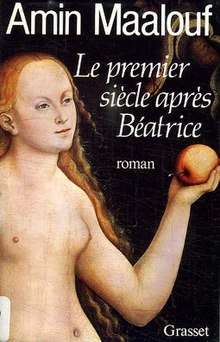The First Century after Beatrice
The First Century after Beatrice (French: Le Premier siècle après Béatrice) is a 1992 novel by the French-Lebanese writer Amin Maalouf. The story is set in a near future, where a pharmacological company markets, in the guise of a traditional folk remedy, a drug by which parents can choose to only have sons. The story is told from the first-person point of view of an entomologist. As the disastrous consequences of the skewed male/female birth ratio resulting from the drug multiply, he transitions from pondering and documenting them to organizing a body of scientists who attempt to reckon with the disaster.
 First edition | |
| Author | Amin Maalouf |
|---|---|
| Original title | Le Premier siècle après Béatrice |
| Translator | Dorothy S. Blair |
| Country | France Lebanon |
| Language | French |
| Publisher | Grasset |
Publication date | 1992 |
Published in English | 1993 |
| Pages | 189 |
| ISBN | 2253097829 |
Reception
John Tague of The Independent wrote: "Although Maalouf's image of the future is not a happy one, this parable never becomes portentous. His prose achieves an effortless lyricism which is always a pleasure to read - a reason, perhaps, for some little optimism in itself. If someone is going to tell a story about the end of the world, we can glean some comfort from the fact that it is told in a voice as refined and delightful as Amin Maalouf's."[1]
References
- Tague, John (1994-01-02). "The unlikely metamorphosis of the future". The Independent. Retrieved 2012-04-12.